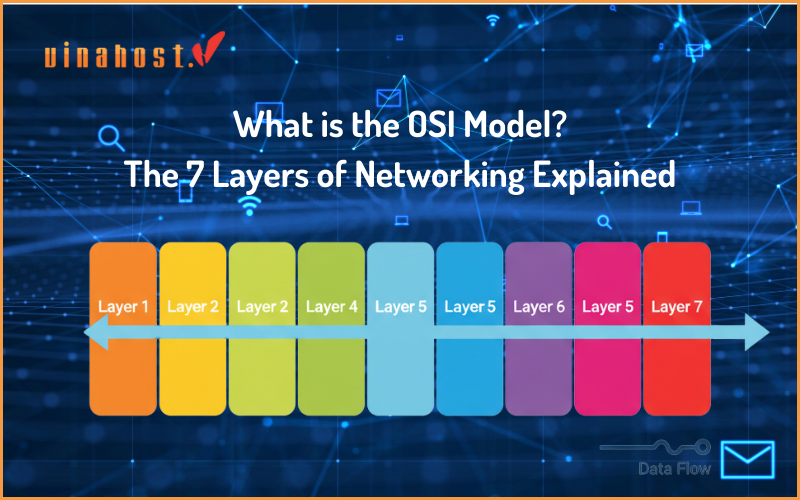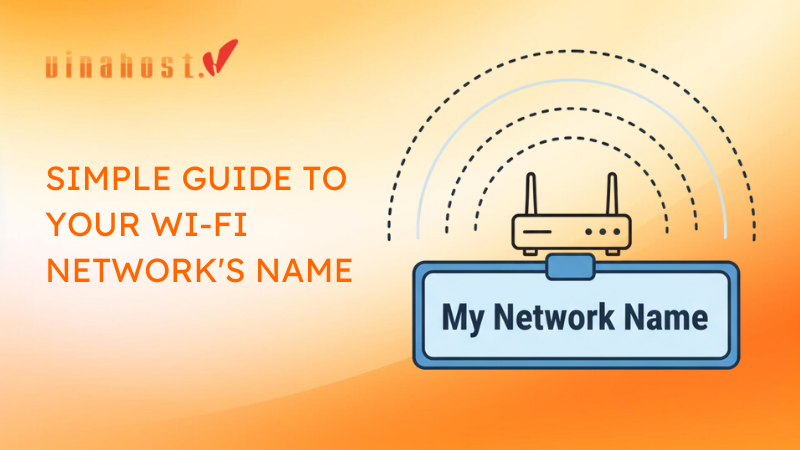In the era of Industry 4.0, using the Internet is indispensable in daily life. However, this also entails many risks. Among them, the biggest risk is data loss, information leakage, or being targeted by hackers. To address this issue, experts have invented VPN technology to better protect users. Let’s explore what VPN is with VinaHost in this article.
1. What is VPN?
VPN stands for Virtual Private Network. A Virtual Private Network is a computer network established over the Internet. It can be used to access websites that may be inaccessible or restricted.
It supports safe and secure internet access. They have the ability to create a virtual private network connection between your device and the internet. Therefore, they act as a protective layer to secure personal information and maintain your privacy online.
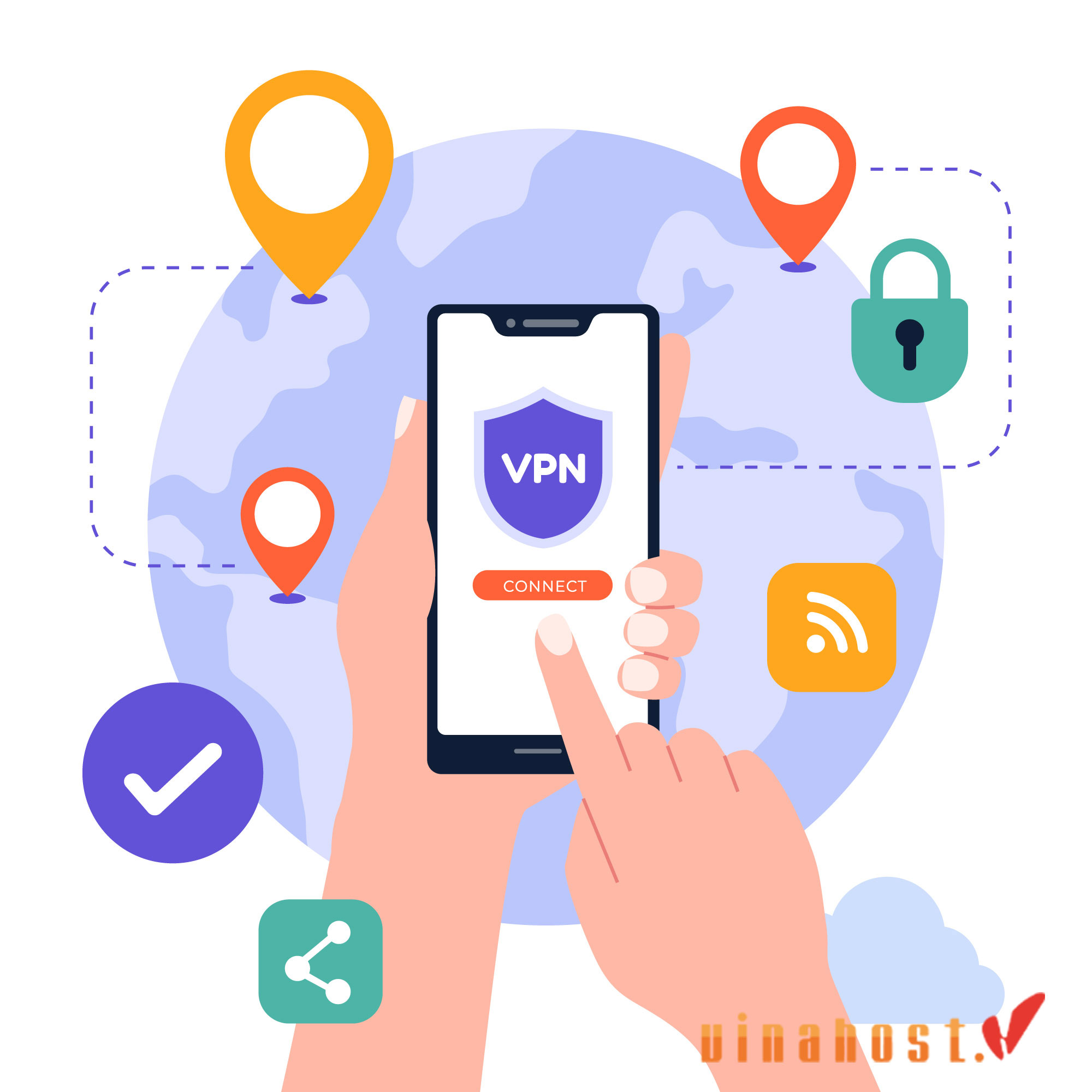
When you connect to a virtual private network, your computer sends all its traffic to the VPN server. The server then encrypts the traffic and sends it over the public network. This means that your personal information is encrypted and transmitted over the internet securely, preventing major threats and risks such as data theft, network attacks, etc. You can use public networks and connect remotely to servers with peace of mind.
Also Read: What is VPS? | Unveiling the Power Behind Virtual Private Servers
2. The history of VPNs
The history of VPNs dates back to the late 20th century when businesses started to recognize the need for secure remote access to their corporate networks. Here’s a brief overview of the key milestones in the evolution of this technology:
- Early Protocols (1990s): In the early 1990s, the first VPN protocols emerged, such as Point-to-Point Tunneling Protocol (PPTP) and Layer 2 Tunneling Protocol (L2TP). These protocols allowed for the creation of secure tunnels over public networks, enabling remote users to access corporate resources securely.
- IPsec Standardization (1990s): Internet Protocol Security (IPsec) emerged as a standard protocol suite for securing Internet Protocol (IP) communications by authenticating and encrypting each IP packet in a communication session. IPsec provides a robust framework for implementations, offering confidentiality, integrity, and authentication.
- SSL VPNs (Late 1990s – Early 2000s): Secure Socket Layer (SSL) VPNs gained popularity in the late 1990s and early 2000s. Unlike traditional VPNs that require client software installation, SSL VPNs leverage standard web browsers to establish secure connections. This made it more convenient for remote users and allowed access to web-based applications securely.
- OpenVPN and Open Source Solutions (2000s): OpenVPN, an open-source VPN solution, emerged as a popular alternative to proprietary technologies. It offered flexibility, cross-platform compatibility, and strong security features. Its open-source nature allowed for community-driven development and widespread adoption.
- Mobile VPNs (2000s – Present): With the proliferation of mobile devices, the demand for solutions compatible with smartphones and tablets grew. It was developed to provide secure connectivity for mobile users, ensuring data protection and privacy on the go.
- Cloud-Based VPN Services (2010s – Present): It became increasingly popular, offering scalable and cost-effective solutions for businesses of all sizes. These services leverage cloud infrastructure to provide secure remote access and site-to-site connectivity without the need for dedicated hardware.
- Advanced VPN Technologies (Present): Modern technologies continue to evolve, incorporating advanced features such as multi-factor authentication, dynamic routing, software-defined networking (SDN) integration, and threat intelligence capabilities to enhance security and performance.
Overall, the history of VPNs reflects the ongoing efforts to address the evolving cybersecurity threats and the growing demand for secure and flexible remote access solutions.
3. How does a VPN work?
A Virtual Private Network operates by concealing the user’s IP address and encrypting data so that only authorized parties can decipher the information.
Essentially, it functions through the following steps:
- The user establishes a connection to a VPN service provider’s virtual private network. This can be done through software installed on a computer or an application on the user’s mobile device.
- The provider assigns the user a new IP address. This IP address is then used to access the internet.
- All data transmitted from the user’s computer or mobile device will be encrypted. This encryption helps protect data from being stolen or intercepted by attackers.
- The encrypted data will be forwarded through the provider’s network.
- At the endpoint of the virtual private network, the data will be decrypted and forwarded to the destination network.
4. Types of VPN connections
4.1. SSL VPN
In the spring of 2020, amid the coronavirus crisis, numerous companies encountered a challenge: insufficient provision of company laptops for all employees to work remotely. Consequently, many employees turned to their personal devices—be it a PC, laptop, tablet, or mobile phone—to fulfill their work duties. To facilitate secure remote access in such instances, companies commonly opt for an SSL-VPN solution, typically deployed through a dedicated hardware box.
Typically, a HTML-5-compatible browser serves as the prerequisite, enabling users to access the company’s login page. These browsers are widely accessible across various operating systems. Entry is secured through a unique combination of username and password.
4.2. Site-to-site VPN
Essentially, a site-to-site VPN functions as a private network, serving to conceal private intranets while facilitating access to shared resources among users within these secure networks.
Such it setups prove beneficial for businesses with multiple locations, each equipped with its own local area network (LAN) connected to the overarching Wide Area Network (WAN). Moreover, they prove invaluable in scenarios where two distinct intranets need to exchange files without granting explicit access to users from one intranet to the other.
Primarily utilized in expansive corporate settings, site-to-site VPNs pose implementation challenges and lack the flexibility characteristic of SSL VPNs. Nonetheless, they stand as the most efficient method for fostering communication among and between sizable departments.
4.3. Client-to-Server VPN
Visualize connecting through a VPN client akin to extending a cable from your home PC directly to the company’s network. This secure connection enables employees to remotely access the company network from their home office and operate as if they were physically present in the office space. However, prior to utilization, installation and configuration of a VPN client on the computer are necessary prerequisites.
This entails the user bypassing their personal internet service provider (ISP) and establishing a direct connection through their provider. This effectively streamlines the initial phase of the process. Rather than relying on the VPN solely to create an encryption tunnel to mask the existing internet connection, it automatically encrypts the data before presenting it to the user.
This type is becoming more prevalent, especially among providers of unsecured public WLAN. It safeguards against third-party intrusion and manipulation of network connections, encrypting data directly to the provider. Additionally, it blocks ISPs from accessing unencrypted data and circumvents any limitations imposed on the user’s internet access, such as government restrictions in certain countries.
This type access offers enhanced efficiency and unrestricted availability to company resources. With a suitable telephone system in place, employees can seamlessly connect to the system using a headset and perform tasks as if they were physically present at their company premises. For instance, customers interacting with the company are unable to discern whether the employee is working from the company office or their home office.
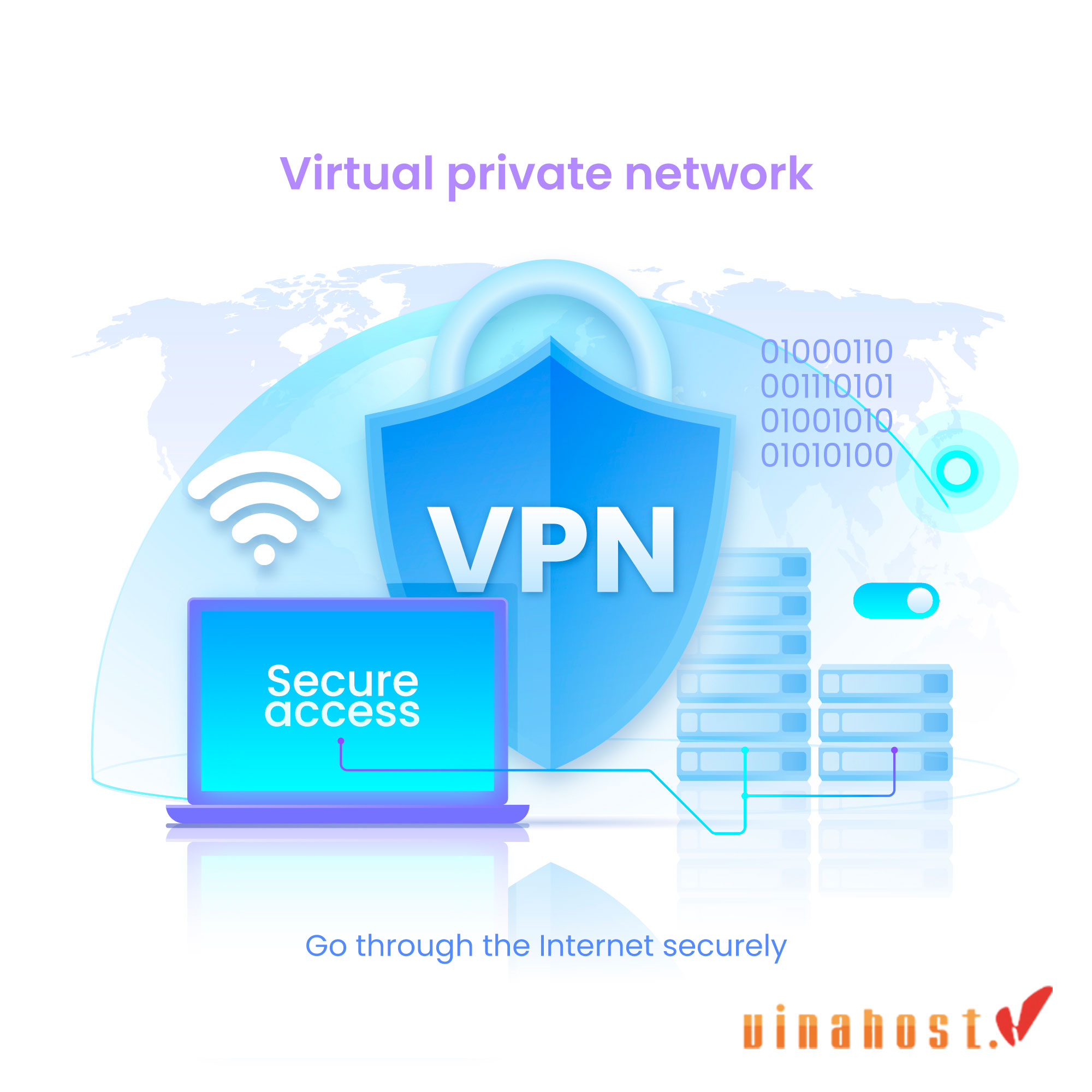
Also Read: What is a Server? Understanding the Backbone of Modern Technology
5. Types of VPN Protocols
The protocol plays a crucial role in establishing secure connections and safeguarding data when using the Internet. VPN protocols are quite diverse to meet specific user requirements and network environments. Below are some commonly used VPN protocols nowadays.
The Point-to-Point Tunneling Protocol (PPTP)
The Point-to-Point Tunneling Protocol (PPTP) is a protocol developed by Microsoft. PPTP is also the most popular and simplest protocol for easy deployment. However, PPTP lacks strong security measures, making it vulnerable to attacks.
t’s one of the oldest VPN protocols and was developed by Microsoft in conjunction with other technology companies. PPTP creates a secure connection between a user’s computer and a remote server over the Internet.
Here’s how it works:
- Tunneling: PPTP encapsulates the data packets from the user’s computer within IP packets. These encapsulated packets are then transmitted over the Internet.
- Encryption: PPTP encrypts the data using a protocol called Generic Routing Encapsulation (GRE). However, the encryption used in PPTP is not considered very secure by modern standards, as it relies on the MS-CHAP authentication protocol, which has known vulnerabilities.
- Authentication: PPTP uses the Point-to-Point Protocol (PPP) to authenticate users. Initially, PPTP used the MS-CHAP protocol for authentication, but later versions introduced stronger authentication methods like EAP-TLS.
The Layer 2 Tunneling Protocol (L2TP)
The Layer 2 Tunneling Protocol (L2TP) provides a secure connection environment and is responsible for supporting data encryption. L2TP often combines with the Internet Protocol Security (IPSec) encryption protocol to enhance security.
Here’s how L2TP works:
- Tunneling: L2TP encapsulates data packets in a PPP (Point-to-Point Protocol) frame to create a tunnel between the user’s computer and the VPN server. This encapsulation allows data to be transmitted securely over the internet.
- Encryption: As mentioned earlier, L2TP itself doesn’t provide encryption. To ensure data confidentiality and integrity, L2TP is commonly used with IPsec. IPsec encrypts the data packets before they are sent over the internet, providing a secure channel between the user’s device and the VPN server.
- Authentication: L2TP uses PPP for authentication, similar to PPTP. It supports various authentication methods, including MS-CHAP, EAP, and others, depending on the configuration.
L2TP is often preferred over PPTP due to its stronger security features when used in combination with IPsec. However, it can be less efficient than other VPN protocols because of the double encapsulation (L2TP within IPsec), which can add overhead to the data transmission process. Despite this, L2TP/IPsec remains a popular choice for VPN implementations, especially in scenarios where strong security is a priority.
The Internet Protocol Security (IPSec)
The Internet Protocol Security (IPSec) is a set of security protocols designed to protect data traffic over the Internet Protocol (IP) network. IPSec provides two main security services:
- Encryption: IPSec encrypts data so that only authorized parties can read it.
- Authentication: IPSec authenticates the source and destination of data to prevent spoofing.
Here’s an overview of how IPsec works:
- Authentication Header (AH): AH provides authentication and integrity protection for IP packets by including a hash of the packet contents in a header attached to each packet. This allows the recipient to verify the identity of the sender and ensure that the packet has not been tampered with during transit.
- Encapsulating Security Payload (ESP): ESP provides confidentiality, authentication, and integrity protection for the payload (actual data) of IP packets. It encrypts the payload to prevent eavesdropping and includes mechanisms for authentication and integrity checks to ensure that the payload has not been altered in transit.
- Security Associations (SAs): SAs are the foundation of IPsec and represent the security parameters (such as encryption and authentication algorithms) negotiated between two endpoints to establish a secure connection. Each SA is uniquely identified by a combination of source and destination IP addresses, security protocol (AH or ESP), and a security parameter index (SPI).
- Key Management: IPsec requires the exchange of cryptographic keys between the communicating parties to establish secure connections. Key management protocols such as IKE (Internet Key Exchange) are used for this purpose. IKE negotiates the security parameters, authenticates the parties, and establishes SAs for secure communication.
The OpenVPN protocol
It is a popular open-source protocol that can be supported across multiple platforms. This protocol typically uses SSL/TLS to establish, connect, and encrypt data. OpenVPN is known for its flexibility and customizability, making it a popular choice for deploying virtual private networks.
Here’s an overview of how OpenVPN works:
- Tunneling: OpenVPN creates a secure tunnel between the client and server over the internet or any untrusted network. It encapsulates VPN traffic in SSL/TLS (Secure Sockets Layer/Transport Layer Security) encryption to ensure privacy and security.
- Encryption: OpenVPN supports various encryption algorithms for data confidentiality, including AES (Advanced Encryption Standard), Blowfish, and others. It also uses HMAC (Hash-based Message Authentication Code) for data integrity to detect tampering or unauthorized modifications to the data packets.
- Authentication: OpenVPN employs SSL/TLS for secure key exchange and mutual authentication between the client and server. This ensures that both parties are who they claim to be and establishes a secure communication channel.
The Secure Socket Tunneling Protocol (SSTP)
The Secure Socket Tunneling Protocol (SSTP) is a protocol created by Microsoft, so it works best on the Windows operating system. SSTP typically utilizes SSL/TLS to encrypt data and provide a secure connection. The SSTP protocol operates over TCP port 443, enabling it to bypass barriers and restrictions on the network space.
Here’s an overview of how SSTP works:
- Tunneling: SSTP establishes a virtual private network (VPN) tunnel between the client and the VPN server over the internet. It encapsulates VPN traffic within SSL/TLS to ensure privacy and security during transmission.
- Encryption: SSTP encrypts the VPN traffic using SSL/TLS, providing strong encryption to protect data confidentiality. It leverages the same encryption algorithms and security mechanisms used in HTTPS to ensure the security of the VPN connection.
- Authentication: SSTP supports various authentication methods, including user credentials, digital certificates, and machine-level authentication. During the connection setup, the client and server authenticate each other to ensure mutual trust and establish a secure communication channel.
Also Read: What is HTTPS? The Secure Gateway to a Safer Internet
6. Benefits of Using a VPN
6.1. Enhanced Online Security
It offers enhanced online security in several ways:
- Encryption: It encrypts your internet traffic, making it unreadable to anyone who intercepts it. This protects your data from hackers, government surveillance, and other prying eyes.
- Privacy Protection: By masking your IP address, VPNs prevent websites, advertisers, and other third parties from tracking your online activities. This helps maintain your privacy and anonymity while browsing the internet.
- Secure Remote Access: It allows secure access to private networks over the internet. This is particularly useful for remote workers accessing corporate resources, as it ensures that sensitive information remains protected even when using public Wi-Fi networks.
6.2. Protection on Public Wi-Fi
Free Wi-Fi is a great convenience, but it can also pose a threat to your privacy and security. When you connect to free Wi-Fi, you’re sharing your internet connection with everyone else using that access point. This means anyone can potentially access your data, including personal information, passwords, and financial details.
Using a VPN when connecting to free Wi-Fi can help protect you from these threats. It encrypts your data before it’s transmitted over the internet, preventing attackers from accessing it. A virtual private network can also help you hide your IP address, allowing you to access the internet without being tracked.
6.3. Access to Restricted Content
One of the most common reasons to use it is to access restricted websites and applications. For example, some countries may block access to certain websites. A virtual private network can help users access these websites and applications by hiding their IP address and allowing them to connect to a VPN server in another country where these websites and applications are not restricted.
6.4. Anonymity and Privacy
It offers anonymity and privacy benefits:
- IP Address Masking: It hides your IP address, making it difficult for websites and online services to track your browsing activities back to your physical location. This enhances your anonymity online.
- Bypassing Internet Restrictions: It allows you to bypass censorship and access geo-restricted content by routing your connection through servers located in different countries. This helps protect your freedom to access information and content online.
By providing anonymity and enhancing privacy, VPNs empower users to maintain control over their online activities and protect their personal information from unauthorized access.
Also Read: What is a Cloud Server? | How does a Cloud Server work?
7. Different Types of VPNs
7.1. Free vs Paid VPNs
Free and paid VPNs offer different levels of service, features, and security. Here’s a comparison:
Free VPNs
- Cost: As the name suggests, it do not require a subscription fee. Users can use them without paying anything upfront.
- Limited Features: It typically offers limited features compared to their paid counterparts. This may include restricted server locations, bandwidth caps, slower speeds, and fewer security protocols.
- Privacy Concerns: Some may log user data or engage in practices that compromise user privacy, such as selling user information to third parties or displaying ads.
- Security Risks: It may lack robust security measures, leaving users vulnerable to data breaches, malware, and other online threats.
- Performance: It often have slower speeds and less reliable connections due to overcrowded servers and limited infrastructure.
- Geographic Restrictions: It may not reliably bypass geo-restrictions on content, limiting their usefulness for accessing region-locked websites and services.
Paid VPNs
- Subscription Cost: It requires a subscription fee, which typically grants access to a wider range of features and better overall performance.
- Advanced Features: It often offer advanced features such as a larger selection of server locations, faster speeds, no bandwidth limits, dedicated IP addresses, and support for multiple devices.
- Better Privacy: It usually have stricter privacy policies and do not log user data. They prioritize user privacy and security.
- Enhanced Security: It employs stronger encryption protocols and security measures to protect users’ online activities and data from unauthorized access.
- Reliability: It tend to have more reliable connections and faster speeds due to better infrastructure and fewer users sharing the servers.
- Customer Support: It typically offer dedicated customer support services, including live chat, email support, and troubleshooting assistance.
In summary, while it can be tempting due to their cost-free nature, they often come with limitations and potential privacy and security risks. It generally offer a higher level of service, better security, and more features, making them a more reliable choice for users who prioritize privacy and performance.
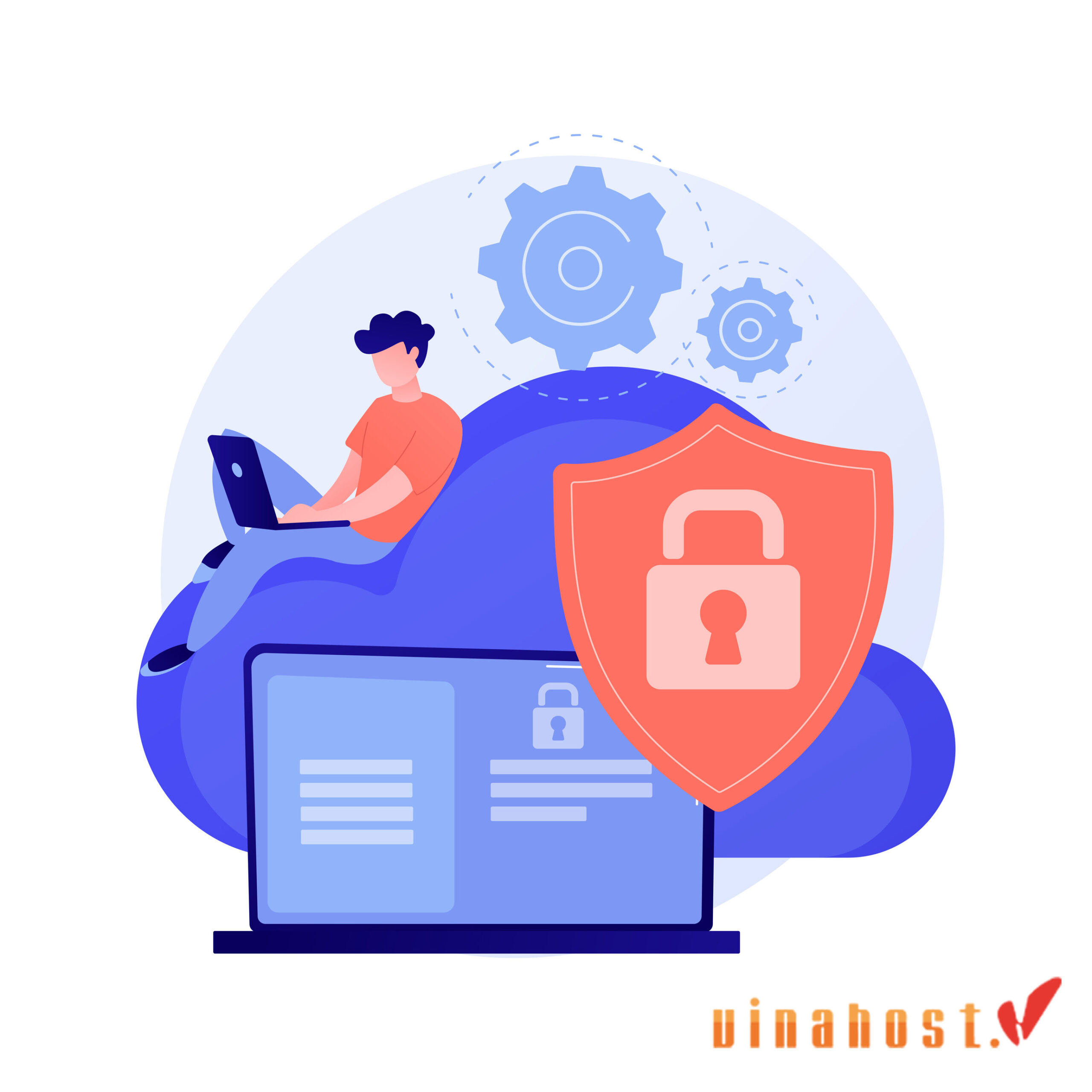
7.2. Personal vs Business VPNs
Personal and business VPNs serve different purposes, tailored to their respective users’ needs.
Personal VPNs:
- Privacy and Security: They are primarily used by individuals to secure their internet connection, encrypt their data, and protect their online privacy from ISPs, hackers, and other entities trying to intercept their data.
- Access to Restricted Content: It allow users to bypass geo-restrictions and access content that might be blocked or restricted in their region, such as streaming services, websites, or social media platforms.
- Anonymous Browsing: They enable anonymous browsing by masking the user’s IP address and location, making it difficult for websites and advertisers to track their online activities.
- P2P File Sharing: Some personal VPNs support peer-to-peer (P2P) file sharing, allowing users to share files privately and securely.
Business VPNs
- Remote Access: Business VPNs are used by organizations to provide secure remote access to their employees, allowing them to connect to the company’s internal network from anywhere securely.
- Data Security: They ensure the security and integrity of sensitive business data by encrypting communication channels and protecting against unauthorized access or data breaches.
- Secure Communication: It facilitates secure communication between different branches, remote offices, or employees working from various locations.
- Network Segmentation: They often include features for network segmentation, allowing organizations to separate different parts of their internal network for enhanced security and control.
- Compliance Requirements: It may need to comply with specific regulatory requirements, depending on the industry, such as HIPAA for healthcare or GDPR for businesses handling European Union data.
While both personal and business VPNs focus on security and privacy, business VPNs are more tailored towards the specific needs of organizations, such as remote access, data protection, and compliance.
8. Choosing the Right VPN for You
8.1. Factors to Consider
Individuals utilize VPNs for various purposes, and regardless of your motive, it’s essential to pose three inquiries before selecting a provider. How quick is it? Will it ensure the security of my data? And will it uphold my privacy? Naturally, you aim for secure connections and safeguarded data. Yet, achieving all this without sacrificing speed? That’s the challenge. Thus, when opting for a VPN service, ensure they make no concessions – possessing unyielding encryption serves no purpose if every webpage takes an eternity to load.
The cost of it is a critical consideration for many users. When a free option becomes available, it naturally piques people’s interest. However, opting for free services may not be advisable. In your quest for speed, security, and privacy, free VPNs are unlikely to meet your needs.
These providers often lack investment in their server infrastructure, leading to potentially unstable connections and IP address leaks. Moreover, they must generate revenue somehow, which may involve compromising user data privacy. Instead of solely prioritizing affordability, it’s important to seek out a provider with a reputation for reliability and trustworthiness.
8.2. Popular VPN Providers
Several providers have gained popularity over the years due to their reliability, security features, and user-friendly interfaces. Here are some of the well-known providers:
ExpressVPN
ExpressVPN is a top-notch platform in the market with smooth-running apps on Windows, Mac, Android, iOS, Linux, and other operating systems. Additionally, the provider offers options with custom firmware for routers. It also provides manual setup guides for tech devices like Apple TV, Fire TV, PlayStation, Chromebook, Kindle Fire, and more.
With over 160 locations in 94 countries and running over 3000 servers, the ExpressVPN system is quite robust. It is also user-friendly and fast. The extended features provided by ExpressVPN are also available on Chrome and Firefox, such as WebRTC leak blocking, location changing, and HTTPS support. Another advantage is its clear and transparent privacy policy.
In Vietnam, it has only one available server, but it still achieves sufficient speeds. You can access desired websites, banking apps, and other applications worldwide at any time.
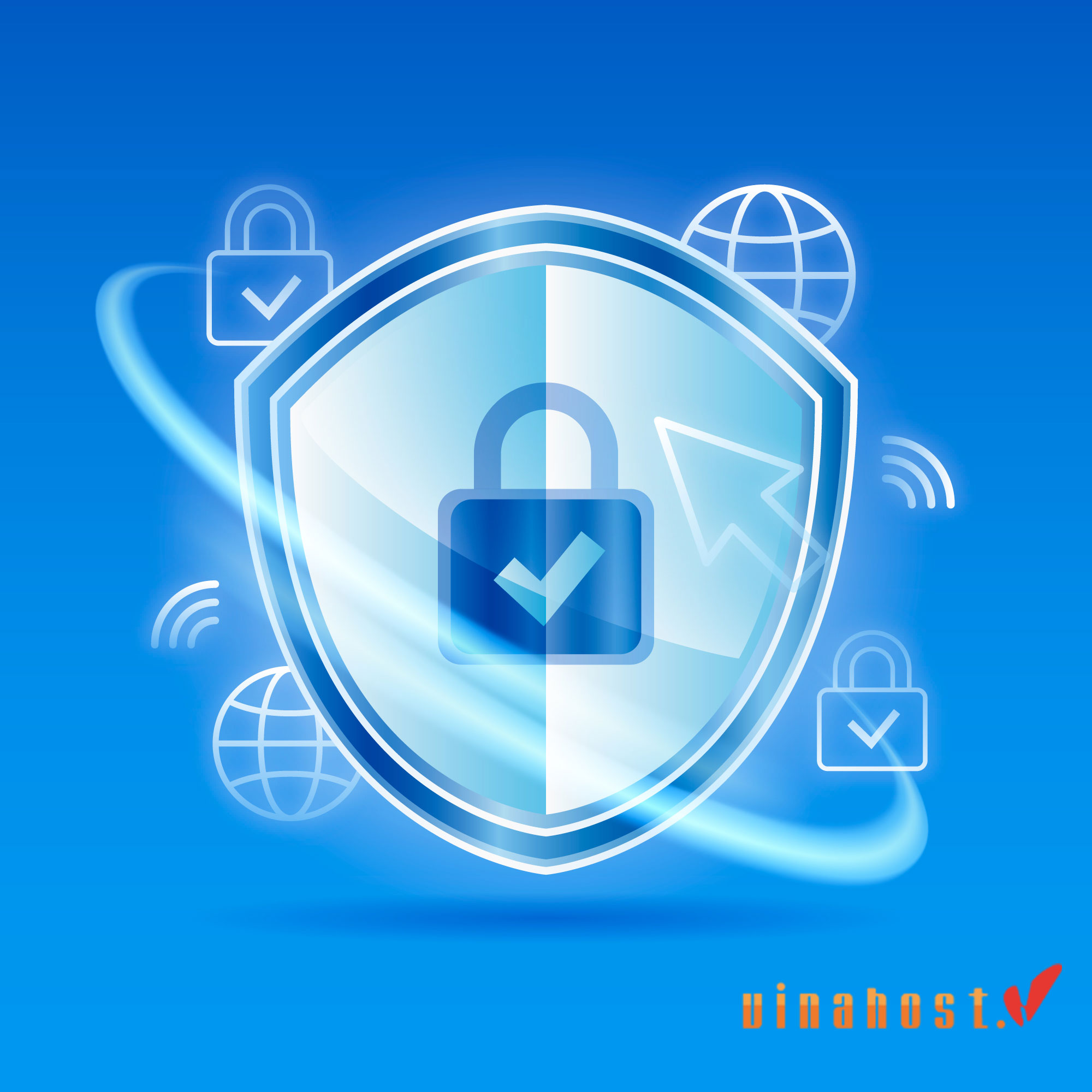
NordVPN
NordVPN has strict login policies, tight control over its virtual private network service, and is highly regarded in the market. This provider is currently leading in many countries around the world. With over 5600 servers in nearly 60 countries, the service provider – NordVPN is now also available in Vietnam.
During speed testing, local servers were not available with the OpenVPN protocol. Therefore, it is advisable to choose a location with strong infrastructure or located in Singapore. Although upload speeds may be limited at times, download speeds have improved significantly compared to not using a VPN.
CyberGhost
CyberGhost has over 6800 servers in 89 countries. Torrenting is allowed on many servers. The company also offers clients for various operating systems such as Windows, Mac, iOS, Android, and more.
In addition to providing regular VPN services, CyberGhost also offers many additional features such as blocking malicious websites, ads, and trackers. HTTPS redirection occurs automatically to ensure the safest connection on all websites. The data compression option can reduce bandwidth and save a significant amount of money.
CyberGhost has over 20 servers in Vietnam, but the infrastructure is still weak. CyberGhost does not support P2P on Vietnamese servers, but users can access servers in Singapore to use it.
Despite some flaws, with the wide range of servers, CyberGhost remains a popular choice for users at a very reasonable price.
Surf Shark
Surf Shark now boasts 1700 servers spread across over 160 locations in 64 countries worldwide. This provider is highly regarded in the market.
Surf Shark allows you to install and run VPN on multiple devices. Surfshark’s service includes:
- URL and ad blocking
- P2P support on servers
- VPN chaining
- Internet traffic splitting
- No logs when the company owns DNS servers
- 24/7 technical support via email and live chat
Although there is only one server located domestically, this provider still performs its functions well. Surf Shark utilizes a high-speed virtual private network to allow you to operate on the internet space with a hidden local IP.
Private Internet Access (PIA)
Private Internet Access (PIA) offers fast and secure virtual private network services across all servers. Additionally, PIA has the capability to support online streaming and torrenting without experiencing lag. PIA is effective in accessing popular online streaming services like Netflix, Disney+, and Hulu.
PIA is also an ideal place for torrenting because this VPN service supports P2P traffic on servers. PIA’s service can bypass firewalls in countries with strict censorship.
VyprVPN
VyprVPN is one of the leading virtual private network service providers, allowing access to over 40 global streaming services. It consistently delivers high performance and avoids caching issues.
It utilizes the Chameleon protocol. This is an exclusive protocol designed to overcome obstacles in the online space. This protocol often employs scrambling features to disguise your VPN traffic and supports unlimited internet browsing.
IPVanish
IPVanish has a fairly large-scale system, consisting of over 40,000 shared IPs and 1,500 servers supporting P2P in more than 75 locations. IPVanish protects user privacy by using AES-256 encryption, an industry-standard.
Furthermore, IPVanish also supports high-security protocols such as OpenVPN and IKEv2. Although this provider does not have local servers located in Vietnam, IPVanish still provides access to the nearest country, which is Singapore.
ProtonVPN
ProtonVPN is headquartered in Europe and does not have servers in Asia, but it has established network connections in Singapore in recent years. Nonetheless, it remains one of the long-standing and reputable businesses.
Users in Vietnam can easily connect to servers. Currently, ithas also updated its interface to be more visually appealing and user-friendly.
TunnelBear
TunnelBear is a provider suitable for new users because it is very easy to use while still ensuring high speed and stability.
TunnelBear has a no-logs policy, which has been regularly tested and verified annually by an independent cybersecurity company. TunnelBear also has a free ad blocker, but it only works well on Chrome.
Before choosing a provider, it’s essential to consider your specific needs, such as the purpose of using the VPN, the level of security required, and whether you need access to specific geo-blocked content. Additionally, it’s crucial to review the provider’s privacy policy and reputation regarding data handling practices.
Check it out: Dedicated Server services in Vietnam
9. The Future of VPNs
The future of VPNs seems poised for significant evolution and adaptation, driven by technological advancements, regulatory changes, and evolving cybersecurity threats. Here are some potential trends and developments to consider:
- Increased Privacy and Security Concerns: As surveillance and data privacy concerns continue to rise globally, there will likely be a growing demand for VPNs that offer robust encryption, zero-logs policies, and other privacy-focused features to protect users’ online activities from prying eyes.
- Enhanced Encryption Standards: With the emergence of quantum computing and the potential threats it poses to traditional encryption methods, providers may need to adopt more advanced encryption standards to ensure the continued security of user data.
- Geopolitical Shifts and Regulatory Changes: Geopolitical tensions and regulatory changes, such as data localization laws and government censorship, could impact the availability and functionality of services in certain regions. providers may need to adapt their strategies to navigate these challenges while continuing to provide reliable service to users worldwide.
- Integration with Emerging Technologies: It may increasingly integrate with emerging technologies such as blockchain, artificial intelligence, and decentralized networks to enhance security, anonymity, and user experience.
- Focus on User Experience and Accessibility: Providers may prioritize improving user experience, developing intuitive interfaces, and expanding support for various devices and platforms to make it more accessible and user-friendly for a broader audience.
- Diversification of Services: Providers may expand their offerings beyond traditional VPN services to include additional features such as secure messaging, ad-blocking, and password management to meet the evolving needs of users in an increasingly digital world.
- Mobile and IoT Security: With the proliferation of mobile devices and Internet of Things (IoT) devices, there will likely be a growing demand for VPNs that offer robust security and privacy protections for these platforms.
Overall, the future of VPNs is likely to be shaped by a combination of technological innovation, regulatory developments, and changing user preferences, with a continued focus on privacy, security, and accessibility.
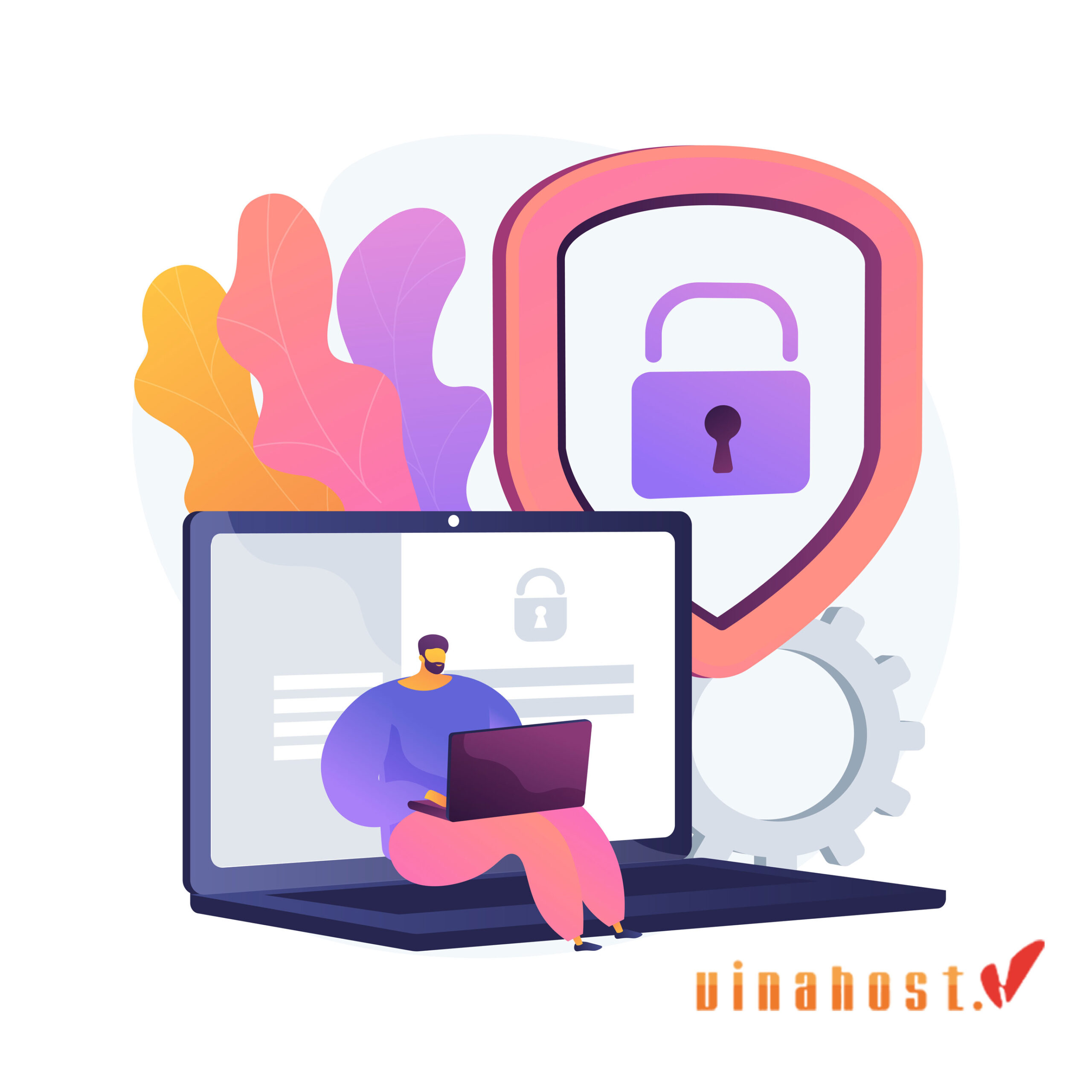
10. FAQs
10.1. Is using a VPN legal?
Yes, using a VPN is legal in most countries. It is commonly used for privacy and security reasons, allowing users to encrypt their internet connection and route it through a remote server, thus masking their IP address and making it more difficult for third parties to track their online activities.
However, it’s essential to note that while VPN usage is generally legal, there may be specific activities conducted through VPNs that could be illegal, such as engaging in cybercrime or bypassing geo-restrictions to access copyrighted content unlawfully.
10.2. Can I use a free VPN?
Yes, you can use a free VPN. Many providers offer free versions of their services, although they often come with limitations compared to paid versions. These limitations may include slower connection speeds, fewer server locations to choose from, data caps, and sometimes less robust security features.
While it can be useful for basic browsing needs or occasional use, it’s essential to be cautious when selecting a free VPN provider. Some free VPNs may compromise your privacy by logging your data or displaying ads, while others may lack strong encryption protocols, leaving your data vulnerable to interception.
If you decide to use it, make sure to research the provider thoroughly, read reviews, and understand their privacy policy and terms of service to ensure they align with your privacy and security needs. Additionally, consider upgrading to a paid VPN service if you require more features, better performance, and enhanced security.
10.3. Which VPN should I choose?
Choosing a VPN depends on your specific needs and preferences, but here are some popular services known for their reliability, security, and performance:
- ExpressVPN: Known for its fast speeds, strong encryption, and large server network spanning numerous countries. It’s user-friendly and offers excellent customer support.
- NordVPN: Renowned for its robust security features, including double encryption, and a vast network of servers worldwide. It also offers dedicated IP addresses and specialty servers for specific purposes like streaming or torrenting.
- Surf Shark: Offers unlimited simultaneous connections, making it an excellent choice for users with multiple devices. Surfshark also provides strong privacy features, including a strict no-logs policy.
10.4. How do I know if my VPN is working?
To verify if your VPN is working properly, you can follow these steps:
- Check your IP address: Before connecting to the VPN, note down your current IP address. You can do this by searching “what is my IP address” on a search engine. Once connected to the VPN, check your IP address again. If it has changed to a different location or appears masked, your VPN is likely working.
- Use an IP leak test: There are online tools available that can check for IP leaks while connected to a VPN. Websites like IPLeak.net or DNSLeakTest.com can detect if your VPN is leaking your real IP address or DNS requests.
- Check for DNS leaks: DNS leaks can occur when your DNS requests are not routed through the VPN tunnel, potentially revealing your browsing activity. You can use DNS leak test websites like DNSLeakTest.com or DNSLeak.com to verify if your DNS requests are properly encrypted and routed through the VPN.
- Verify server location: If your VPN client allows you to select specific server locations, ensure that the server you’ve chosen matches the location you intended to connect to. You can use online tools or services to check the location of your IP address.
- Test internet connectivity: While connected to the VPN, browse the internet and access different websites to ensure that your internet connection is working correctly. You can also test the speed of your connection to see if it’s consistent with the VPN’s advertised speeds.
By performing these checks, you can verify that your VPN is working as intended and that your online activities are protected and anonymized. If you encounter any issues or suspect that your VPN may not be working correctly, contact your VPN provider for assistance.
10.5. Is it safe to use a free VPN?
Using a free VPN can have both advantages and risks. Here are some factors to consider when assessing the safety of a free VPN:
Advantages
- Cost: It don’t require a subscription fee, making them an attractive option for users looking to save money.
- Basic Privacy Protection: It can provide basic encryption and help mask your IP address, offering some level of privacy and anonymity online.
- Accessibility: It is accessible to anyone, making them a convenient option for occasional use or for users in regions with restricted access to paid VPN services.
Risks
- Data Privacy Concerns: Some may log your online activities and personal data, which could be sold to third parties for advertising or other purposes. This compromises your privacy and defeats the purpose of using a VPN.
- Security Vulnerabilities: It may lack robust security features, leaving your data vulnerable to interception or hacking. Additionally, they may not receive regular updates or patches, increasing the risk of security breaches.
- Limited Features and Performance: It often come with limitations such as slower connection speeds, data caps, and fewer server locations compared to paid VPNs. This can impact your browsing experience and limit the usefulness of the VPN.
- Malware and Adware: It may inject ads or malware into your browsing sessions, posing a threat to your device’s security and privacy.
Overall, while it can be a convenient option for casual users, it’s essential to choose a reputable provider with a transparent privacy policy and strong security measures. Additionally, consider upgrading to a paid VPN service if you require more advanced features, better performance, and enhanced privacy protections. Always research and carefully evaluate the risks and benefits before using a free VPN.
10.6. Can a VPN make me completely anonymous online?
While VPNs offer significant privacy and security benefits, they do not make you completely anonymous online. Here are some reasons why:
- IP Address: While a VPN hides your real IP address by routing your internet traffic through its servers, the provider still knows your true IP address. Additionally, if provider keeps logs of user activity, law enforcement agencies or other parties could potentially obtain this information.
- Data Logging: Not all providers have a strict no-logs policy. Some may keep logs of user activity, including connection timestamps, bandwidth usage, and websites visited. This data could potentially be used to identify users.
- Leaks: It can sometimes suffer from IP, DNS, or WebRTC leaks, which could expose your real IP address or DNS requests, compromising your anonymity.
- Browser Fingerprinting: Even when using a VPN, websites can still collect information about your browser and device, such as browser version, operating system, screen resolution, and installed plugins. This information can be used to create a unique fingerprint, potentially identifying you across different websites.
- User Behavior: Your online behavior and habits, such as the websites you visit, the content you interact with, and your communication patterns, can still be tracked and analyzed by various entities, including websites, advertisers, and social media platforms.
While it can significantly enhance your online privacy and security by encrypting your internet traffic and masking your IP address, it’s essential to understand its limitations. To maximize your anonymity online, consider combining a VPN with other privacy-enhancing tools and practices, such as using Tor, employing browser privacy extensions, and practicing good online hygiene, such as avoiding sharing personal information unnecessarily and using strong, unique passwords for your accounts.
10.7. Is it difficult to set up and use a VPN?
Setting up and using a VPN can vary in difficulty depending on the provider and the device or platform you’re using. However, in general, it is designed to be user-friendly and straightforward to set up. Here’s a general overview of the process:
- Choose a Provider: First, you’ll need to select a provider that suits your needs and preferences. Consider factors such as server locations, security features, privacy policy, and pricing.
- Sign Up and Download: Once you’ve chosen a provider, sign up for an account on their website and choose a subscription plan. After signing up, download the VPN client or app for your device or platform. Most providers offer apps for Windows, macOS, iOS, Android, and sometimes even for routers or other devices.
- Install and Configure: Install the VPN client or app on your device and follow the setup instructions provided by providers. This usually involves logging in with your account credentials and configuring your preferences, such as selecting a server location or enabling specific security features.
- Connect to a Server: After configuring the settings, you can connect to a server by selecting a location from the available options in the app or client. Once connected, your internet traffic will be encrypted and routed through the VPN server, masking your IP address and providing privacy and security.
- Verify Connection: After connecting to the server, you can verify that it is working correctly by checking your IP address, performing DNS leak tests, and testing your internet connectivity.
Overall, setting up and using a VPN is generally straightforward and can be done in a few simple steps. If you encounter any issues during the setup process, most providers offer customer support resources, including setup guides, troubleshooting articles, and live chat support, to help you get started.
11. Conclusion
Through the article What is VPN, we can see the importance and practical applications of a Virtual Private Network for individuals and organizations, including businesses. So, feel free to contact us when you need support:
- Email: support@vinahost.vn
- Hotline: 1900 604
- Livechat: https://livechat.vinahost.vn/chat.php
You can also check out other interesting articles HERE to stay updated with new knowledge every day.
What is Domain & How It Impacts Your Online Presence
What is a Dedicated Server? | How Does a Dedicated Server Work?


 Tiếng Việt
Tiếng Việt English
English 简体中文
简体中文


















































































